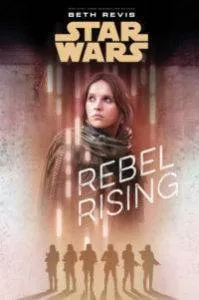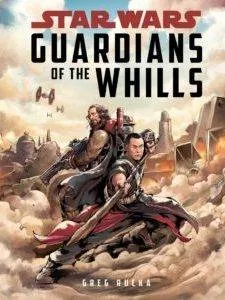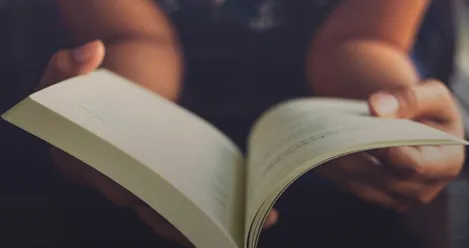
c. Disney/Lucasfilm Press
My head knows there’s a lot of excellent YA stuff out in the world. My brain believes it.
I haven’t actually
read most of it.
Why? Why is a loaded question.
It is, in part, because YA didn’t exist in its current form, or in any decent form at all really, when I was a member of the target demographic, so I didn’t have an opportunity to jump on the wagon (yes, I’m old). One can only read
My Brother Sam is Dead so many times and going through the effort to sneak
Sweet Valley High faced diminishing returns when, at the tender age of eight-ish, I was let loose in the worlds of adult science fiction and fantasy.
The other part? Well, I’m going to have to admit something a bit unsavory about myself here. I have, at times, been a book snob. I’m not proud of it, mind, but after making a few poor YA choices (and I couldn’t tell you what they were now if my life depended on it) I jumped from disliking specific books to pooh-poohing an entire body of literature based on a very small sample size.
Totally unfair. There are, as we all know, many,
many bad books of all sorts and to single out YA as unworthy because of a few was incredibly close minded of a person who is usually very much not that. Yes, I do have a years long TBR pile and limited reading time but the fact remains I rejected recommendations from friends with whom I know I share taste in books simply because, when I went to purchase or borrow from the library, said books bore a “young adult” stamp.
Shame. On. Me.
You will all be happy to hear that my eyes have been opened and I have been duly chastised by my conscience, which is very harsh and also kind of a jerk. An honest jerk. A very, very honest jerk.
I have missed out on a huge pile of great novels and I would have missed out on even more, if not for
Star Wars and my own children who, while not yet young adults themselves, enjoy having my husband and I read them novels in that vein as bedtime stories (now almost 5 and 7, they’ve partaken of Rick Riordan’s entire catalogue. The hubs is currently reading them
The Hitchhikers Guide to the Galaxy).
Have I enjoyed the
Star Wars YA novels unilaterally? I have not. I didn’t care for
Ahsoka, which bummed me out as she is one of my favorite characters in the saga. The Luke and Leia novels released just prior to
The Force Awakens weren’t bad but they weren’t nearly as enjoyable as Greg Rucka’s
Smugglers Run: A Han Solo and Chewbacca Adventure.
I probably wouldn’t have purchased any of them, including Rucka’s new
The Guardians of the Whills, Claudia Gray’s
Lost Stars, or Beth Revis’
Rebel Rising for myself, but the kids are
almost as into
Star Wars as I am and we were low on material, so into the cart the trio went. Unfortunately, as a nurse, I work an irregular schedule and I’m not always home for bedtime, which means I’m not always home to read, and rather than either the hubs or I having to catch up, we read the kids different books on our respective nights. I was about halfway through
The Guardians of the Whills when I had a string of late evenings and he started
Hitchhikers and they were hooked.

c. Disney/Lucasfilm Press
To my surprise, I was disappointed we didn’t have the opportunity to finish Rucka’s Chirrut Îmwe and Baze Malbus tale.
And suddenly, I found myself reading it on my own.
I finished and I wanted more so I started, and finished,
Rebel Rising in two or three sittings. After
Rebel, I found
Lost Stars on my Kindle app, where it had been sitting for months and read that.
Now, I’m disappointed there’s no more until the fall.
I know, right?
What is it about these particular YA novels which grabbed me and pulled me in? Which held me when others had not? There were a few common threads:
- The Guardians of the Whills, Rebel Rising, and Lost Stars are respectful of their readers. All three authors managed to craft age-appropriate stories without using juvenile language or censoring topics. Guardians is one of the most gorgeous books I have read in some time, regardless of target audience. Both Rebel Rising and Lost Stars deal with the discoveries of sexuality and the realties of war, with love and loss, in utterly honest, but sensitive, manners which invite contemplation and conversation. Children and teens are far more perceptive, as people and as readers, than most adults give them credit for but Rucka, Gray, and Revus are clearly well apprised and never fall back on tropes or banality.
- Good storytelling: Guardians, Rebel, and Lost Stars are all part of the new Star Wars canon and, as such, I am certain there are specific beats each author was asked to hit, yet each of the three manages to do so without their stories feeling forced, tired, or contrived. Each novel builds organically, driven by the needs of the plot and characters rather than as a means to an end as was often the case in my previous YA experience and is a particular pitfall of novels which are part of a massive franchise. Each of the three aforementioned also had a near perfect blend of action and character development, quieter moments which provided the reader with the opportunity to get to know, and to grow to care about, the characters while still being caught up in the adventure.






